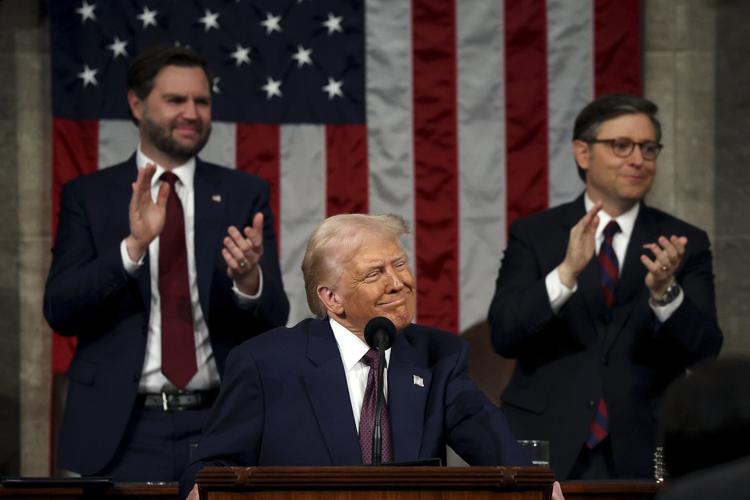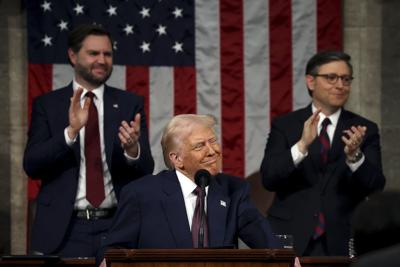OTTAWA — The reality and the pain of a Donald Trump-led trade war set in Tuesday, and the tariff theatrics got weirder.
After the U.S. president slapped all Canadian and Mexican products with a 25 per cent import duty and a 10 per cent levy on oil and gas, Prime Minister Justin Trudeau channelled this country’s sense of dismay, betrayal and fury. He authorized counter-tariffs to fight back in an “unjustified” trade war launched by Trump whom he said is using border concerns as a pretext to collapse this country’s economy and “annex us.”
By then, the U.S. tariffs had been in effect since the wee hours, the stock markets had plunged, and millions of import duties due at the border were racking up.
As U.S. President Trump’s tariffs take effect with 25 percent on Canadian goods and 10 percent on energy, experts are warning of job losses and serious consequences for the economy. In response, Trudeau has imposed retaliatory tariffs on American products. But beyond the politics, what does this mean for Canadians? Star reporter Kevin Jiang breaks it all down with Saba Eitizaz.
Trucks full of Canadian-made auto parts and cars still crossed into America. One industry leader, Flavio Volpe, tallied the cost at around $75 million on the daily $300-million worth of automotive products shipped stateside.
But for Canadians and their political leaders, it was a Rubicon that had been crossed, not a border, and trust in the U.S. was broken.
Premiers announced American alcohol would be pulled off provincial shelves, and many would bar U.S. companies from billions in annual government procurement. Trudeau vowed further nontariff measures to come and blasted Trump, hauling back the curtain on what he now says has been Trump’s real play all along.
Trudeau said in pursuit of Trump’s goal to make Canada a 51st state, “the United States launched a trade war against Canada, their closest partners. At the same time, they’re talking about working positively with Russia, appeasing Vladimir Putin, a lying, murderous dictator. Make that make sense.”
Trudeau has given the green light to a Canadian retaliatory plan first unveiled last month, starting with immediate 25 per cent counter tariffs on about $30 billion worth of American imports, with tariffs on another $125 billion worth of American products to take effect in 21 days.
Canada will also file formal complaints against the U.S. under the World Trade Organization and the Canada-U.S.-Mexico Agreement on free trade, which Trump signed in 2019, and will co-ordinate with provinces an array of nontariff measures to demonstrate “there are no winners in a trade war.”
The Canadian countermeasures will remain until the U.S. tariffs are withdrawn, Trudeau said.
Trump immediately doubled down, threatening on Truth Social he’d match Trudeau’s retaliatory tariffs and increase the penalties on Canada once he imposes “reciprocal” tariffs — as he’s threatened on all global imports — on April 2.
Yet within a couple of hours of Trump’s new threat, the by-now familiar whipsaw effect of dealing with Trumpworld was on full display.
Commerce Secretary Howard Lutnick took to Fox News airwaves to say there is still room to talk.
“Both the Mexicans and the Canadians were on the phone with me all day today trying to show that they’ll do better, and the president is listening because you know he’s very, very fair and very reasonable. So I think he’s gonna work something out with them,” Lutnick said, predicting they would land “somewhere in the middle.”
But Trump nevertheless later told Congress he intended to use tariffs as a weapon to force companies to make their products in America, to reverse trade deficits with Mexico and Canada, and to stop what he continued to claim is a flood of illegal fentanyl across U.S. borders. (U.S. border data refutes that in Canada’s case.)
Trump accused “many” countries of wielding “enormously high” tariffs against the U.S., naming the European Union, China, Brazil, India, Mexico and Canada for particular punishment.Â
Trudeau earlier said Trump was not taking his calls but held out hope they would talk. Late Tuesday night, officials confirmed American news reports the two leaders would talk Wednesday morning.
Finance Minister Dominic LeBlanc did speak to Lutnick Tuesday, but Canadian officials refused to say whether Canada had in fact promised to “do more” — and expressed little optimism that anything would change.
Instead, premiers, Doug Ford among them, vowed to stand together and blasted Trump.
In a letter to American senators, congressional members and state governors, Ford talked tough: “If these tariffs persist, or if the Trump administration moves forward with any additional tariffs, Ontario will apply a 25 per cent surcharge on the electricity we export to New York, Michigan and Minnesota,” adding he won’t hesitate to hike the surcharge or “if necessary, shut the electricity off completely.”
Nova Scotia Premier Tim Houston called Trump a “short-sighted man who wields his power just for the sake of it.”
In an interview with the Star, Newfoundland and Labrador Premier Andrew Furey said the prime minister’s remarks struck the right chord in alerting Canadians to the real threat they face.
One of the most “chilling moments” the premiers faced on their recent trip to Washington, he said, was to hear American officials tell them “in very straight and direct terms that ‘take the president at his word’” that he was serious about tariffs and his belief that “Canada could be a beautiful 51st state.”
“He’s never going to change his mind,” added Furey.
The prime minister said he too had been hoping Trump’s tariff threats were just a negotiating ploy, but the president’s remarks Monday — that there was nothing Canada or Mexico could do to avoid the tariffs — “underlines very clearly what I think a lot of us have suspected for a long time, that these tariffs are not specifically about fentanyl.”
If a new deal on trade is what Trump wants, Canada is “open” to start negotiations early on the Canada-U.S.-Mexico agreement, which is up for review next year, Trudeau said.
But he noted Trump was chirping on social media again Tuesday that U.S. banks can’t operate in Canada when in fact they are “alive and well and prospering” here, meaning Canadians must contend with the fact Trump intends to force “the one thing he has said repeatedly, that what he wants is to see a total collapse of the Canadian economy, because that will make it easier to annex us.”
Trudeau’s condemnation of Trump’s move was fully backed by Conservative Leader Pierre Poilievre.
“At 12:01 a.m., President Trump stabbed America’s best friend in the back,” Poilievre said. “My message to the president is this: Canada will fight back. We will defend our people and our economy, and we will put Canada first. There is no doubt that our economy will suffer, but so will yours, President Trump.”
Conservative Leader Pierre Poilievre says Canada needs to retaliate against American tariffs by targeting U.S. goods Canada can make, does not need or can obtain elsewhere. He says almost all money collected from counter-tariffs should go to tax cuts, with a small sum set aside for the workers hit hardest by the trade war. (March. 4, 2025 / The Canadian Press)
Poilievre called for “dollar-for-dollar” retaliatory tariffs — which Trudeau has previously suggested is all but impossible as it would represent Canada’s trying to hit some $600 billion worth of American products. The Conservative leader said any revenue raised by Canada’s counter-tariffs (which will be paid on American products by Canadian consumers) should be used to help affected workers and to provide a broad-based income tax cut.Â
Trudeau said the federal government will support Canadian workers and employers who are impacted by the tariffs, saying quick aid could come via the employment insurance program, however he said he was not looking to “manage” a trade war but to swiftly end it.
NDP Leader Jagmeet Singh called on Parliament to be brought back immediately in order to deliver an aid package for workers, predicting the economic fallout will be worse than that caused by the pandemic. He softened his previous stance that he would defeat the minority Liberal government at the first opportunity.
NDP Leader Jagmeet Singh is calling for government supports similar to those introduced during the pandemic, adding the tariffs' economic impact may be worse than what Canada experienced during COVID-19. Singh says the House of Commons should be recalled to deal with the needs of workers before an election is called. (March. 4, 2025 / The Canadian Press)
Canadian Labour Congress president Bea Bruske warned against job losses and economic pain, saying governments across the country cannot respond with “half measures” and “empty words.”
“This war will not be won on the cheap,” she said.
Trudeau said there is no way to “sugar coat” the coming pain for Canadians, and spoke to Americans, warning that the president’s claims about their closest ally were “totally false,” that he is “sabotaging” his own agenda. A trade war will cost Americans jobs, higher prices and economic pain — in part caused by Canada’s plan to counterpunch.
Tariffs will also harm “American national security,” Trudeau said, because they will impede access to “the abundant critical minerals, energy, building materials and fertilizers that we have and that the United States needs to grow and prosper.”
The prime minister directly called out the U.S. president, saying he wanted to address “one specific American: Donald,” he said, calling the president by his first name repeatedly.
“We’ve done big things together on the world stage as Canada and the U.S. have done together for decades, for generations. And now, we should be working together to ensure even greater prosperity from North Americans in a very uncertain and challenging world.”
Trudeau quoted the Wall Street Journal, which headlined Trump’s moves as triggering the “dumbest trade war in history.”
Prime Minister Justin Trudeau said U.S. President Donald Trump's decision to pick a trade war is a "very dumb thing to do." Trudeau says Canada is fighting back with retaliatory tariffs and will escalate that retaliation if the tariffs don't come off. (March 4, 2025 / The Canadian Press)
“Donald, they point out that even though you’re a very smart guy, this is a very dumb thing to do.”
He said it will embolden opponents of Canada and the U.S. to see the two countries fighting.
Trudeau, who is now in his final week as Liberal leader, said how long he remains prime minister will be up to the next Liberal leader, who will be elected Sunday by party members. “It should happen reasonably quickly, but there’s a lot of things to do in a transition like this, particularly at this complicated time in the world,” he said.
Asked if he would impose export tariffs on oil and gas or potash shipments to the U.S. in spite of provincial objections, Trudeau dodged a direct answer.
“The most important thing we can do is ensure that Canadians remain united,” he said. “That’s why, whatever response, individually or collectively we do across the country, we have to make sure that no single part of the country is carrying a greater burden or suffering any more than everyone else.”
With files from Mark Ramzy and Robert Benzie




































To join the conversation set a first and last name in your user profile.
Sign in or register for free to join the Conversation